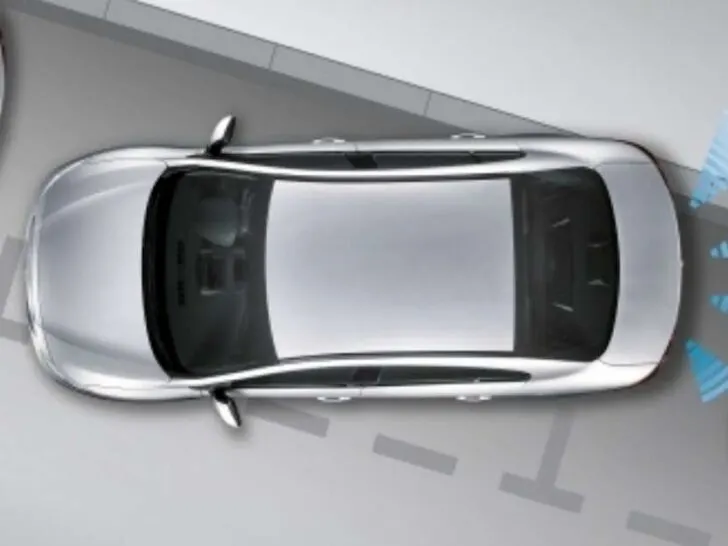The advancement in technology and the addition of parking sensors in all of the latest trucks make parallel parking easy and safe. These are also helpful in reversing your vehicle.
Does Rain Affect Parking Sensors? Rain affects the working of parking sensors, and water enters its internal components from the bumper side. You can continuously hear the beeping sound due to these faulty sensors. In addition, the light remains blinking on the screen, which is annoying for drivers. The false recognition of objects also occurs. The beeping alarm turns on when there is no nearby vehicle or objects, which can confuse drivers. You should use WD-40 sprays and a dry cloth or towel to dry the water.
The pickup trucks are larger, and parking them in a congested area is difficult. Therefore, they assist the driving and produce the beep sound after sensing the curbside.
What are parking sensors in pickup trucks, and how do they work?
These are the small devices in the latest automobiles to increase their safety features. These are present on the front and rear bumpers to detect nearby objects.
The main function of this tiny gadget is to identify the nearby vehicles, walls, curbside, potholes, and all of the hurdles on the road.
Two types of these sensors come into the market, and both of them have different working principles. One of them is the ultrasonic type that uses the sound wave to find objects and other cars on the road.
It emits sound waves, and the reflector receives them to calculate the distance between your truck and the object causing the hurdle.
The other types are connected to your large infotainment screen. As a result, the rear side picture comes on the screen clearly, and you do not have to turn on the backside while reversing.
The other type is electromagnetic, which is helpful to sense the objects present in your surroundings. These types of devices use frequencies to generate the electromagnetic field.
The alarm and warning light appears when something enters this magnetic field area.
How does rain affect the parking sensors?
The rainwater affects the working of parking sensors and makes them faulty. Many people complain that these tiny devices become faulty when they park their trucks outside in heavy rain.
Continuous beeping sound
The rainwater comes into its internal components from the bumper side. Therefore, the increase in humidity and water in them affect their functioning.
Many people complain that sometimes they are unaware that there is rain outside and their trucks are on the road.
It is problematic for them when you turn your vehicle on for driving. This is because you can continuously hear the beeping sound while driving.
The continuous beeping sound makes the drivers distracted and annoyed. In addition, the red color also remains on, which can make you confused while driving.
Incorrect recognition of objects
The moisture due to rainwater in the parking sensors causes incorrect recognition of objects and automobiles.
The sensors do not turn on the alarm or red light when something is near you. The faulty ones can also put the life of drivers and passengers at risk and increases accidents.
In addition, false recognition occurs when the alarm beeps frequently, and nothing is near you.
The driver becomes panic apply the brakes to stop, but there is nothing behind and in your surroundings. Identifying objects at the wrong time is the real problem, and you must fix it for safe driving.
Effect on wires
The moisture also gets its wires and interrupts its functioning. People complain that sensors did not show any signals when they parked their trucks in heavy rains.
The moisture enters into wires and makes them faulty. In addition, the inappropriate current flow between the wires makes them faulty and cannot produce the beeping sound.
In addition, the short circuits are also produced in wires because of moisture in them.
What are some other causes that affect the working of parking sensors?
The only rainwater does not make them faulty, but several other causes affect their everyday working. You should also check these issues when the sensors are not providing appropriate or irregular signals.
Accumulation of debris
The accumulation of debris and dirt is common on their lens during driving. The dust comes on its surface when you take the trucks for off-roading.
These are unpaved roads and have more dust and dirt than regular highways. In addition, driving in muddy areas also causes mud splashes on its surface.
They cannot work appropriately due to the presence of these particles. Therefore, you should take care of and clean them regularly for their appropriate functioning.
You can mix water and hand washing detergent to wipe off the dust from their surfaces.
Cold weather
The cold weather is not suitable for these sensors because of increased humidity levels. The snow and water come on its surface when you park them outside at night.
The ice and water disturb their working, and they start to function irregularly. In addition, the beeping sound and appearance of warning lights also come irregularly, which can confuse drivers during driving.
How do you dry the parking sensors after a rain?
Drying the rainwater from these gadgets is necessary for safe driving on roads. You can try different methods to wipe off the moisture from its surface.
Use WD-40
WD-40 is a famous brand in America that acts as a cleaner, lubricant, and water repellent. People use them to remove moisture from different parts.
You can also use this water repellent to dry the parking sensors after rain. The bottle is small, and you can keep it in your truck to tackle emergencies.
Spray the WD-40 on the sensors and then wait for a few seconds so it can suck the moisture from its internal parts.
Use the soft and dry cloth to tap on its surface for cleaning. WD-40 is a short-term solution, and you have to make them completely dry on warm days.
Rest the sensors
It is also necessary to reset these sensors after heavy rain for their correct working. First, turn off the ignition and wait for 1 to 2 minutes.
Turn on the ignition and also turns on the sensor button. The button is present on the front side of your truck, and it is labeled with P.
Press and hold the button for 2 to 3 minutes until you hear the beeping sound and blinking of the red light on the screen.
Take the truck to dealerships
Many people become worried after hearing the unusual beeping sound from these devices. You can take your trucks to dealerships and service centers in this situation.
The dealerships use the WD-40 sprays to dry the rainwater from its internal components. Sometimes the issue persists after using this spray, and warning lights keep blinking on the screen.
The experienced mechanic uses the scanner tool to identify the exact problem.
How do you protect the parking sensors from rainwater?
You must protect your pickup trucks and their parts from the rainwater and its damaging effect. Early prevention can reduce the risk of damage and repair costs.
Use wraps
Many people complain that they do not find a slot in parking areas and have to stop their pickups on the roads during heavy rain.
In addition, many of my friends also said that sudden rain is the real problem and people do not know about it.
You should use plastic wraps to cover them. The plastic wraps are beneficial because they can protect the water and moisture from them.
Use shady parking area
Use shady areas to park your vehicle in the winter season. However, you can also use truck covers when you want to park them for longer.
The truck covers are also useful in homes that have open parking areas. Shady areas reduce water exposure to different parts of vehicles during rainy days.
Avoid driving during rain and wet roads
These are present on the lower side of bumpers and are at more risk of road splashes. In addition, the water on rainy days accumulates on the road.
It can come on these devices when you move speedily from these roads. The splashes of water on the front bumper are also problematic and make them faulty.
In addition, the water splashes also come from the wet road and increase the humidity level in its internal parts.
What are the benefits of using parking sensors in trucks?
The upgraded feature in trucks provides a comfortable and secure ride to people. Many also install them in their vehicles as an aftermarket addition for comfortable driving.
Beneficial in congested parking areas
The parking areas have become congested due to the increased number of populations. As a result, there are more automobiles on the road and in parking slots.
Some people find difficult to park because of the less or little space. Therefore, you need safety sensors to park in these congested areas.
They are beneficial in reducing your stress and effort while stopping in congested areas.
Moreover, you can easily park in the parallel slots without hitting other cars and close-by objects.
Increase safety
I like this feature in my truck because it can decrease the risk of accidents on the road.
In addition, it also decreases the risk of hitting other cars. You do not feel difficulty while reversing and moving on turning points.
It helps to make the drivers aware of any nearby objects that cause a damaging situation.
Useful at the night
The drivers have weak eyesight, and it becomes difficult for them to drive during the night. The visibility during nighttime decreases due to less light and more reflections of headlights.
Sometimes people cannot see the vehicle behind them due to poor eyesight and get hit by it.
The hitting with them can produce scratches and dents on different parts. In addition, it can increase your repairing and maintenance costs.
Good for new drivers
It is best for new drivers and the young population of America that does not have much experience in driving skills.
The parking sensors assist these people in safe and comfortable driving without risk of accidents and crashes.
Some new drivers have little or less knowledge about parking areas. You can hit with other tucks while parking them in parallel positions.
The new drivers do not have a great command of driving rules and regulations. So these tiny gadgets help make them aware of anything near them.
The sensors use the beep alarm and red color warning light on the dashboard screen. The alarm becomes faster when moving close to the hurdles or objects.
Related Articles:

